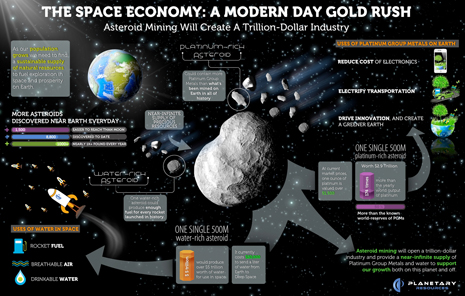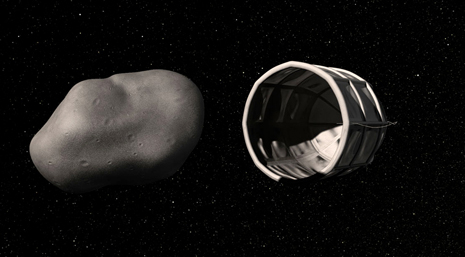Maverick Life, World
Space, the mining frontier

Earth doesn’t have an infinite supply of precious metals and rare commodities. Environmental challenges are making these increasingly more costly and difficult to excavate. But there’s an infinite supply of gold, platinum and other valuable resources in space, and the race is now on to get to them first. By MANDY DE WAAL.
Peter Diamandis has a serendipitous name for mining, but unlike Patrice Motsepe, Diamandis doesn’t have his sights set on earthbound excavation. He wants to scour the solar system for Near-Earth Asteroids, from which he plans to extract rare resources. His idea is to mine asteroids for commodities that range from water to precious metals.
Diamandis is what you’d call a polymath. He studied molecular genetics and aerospace engineering at MIT before going to Harvard Medical School and becoming a medical doctor. During his first year at MIT he founded 15 companies, most of them focused on his personal slogan, which is “The best way to predict the future is to create it yourself!”
The man who speaks on “incentivised innovation” and has just published Abundance — the future is better than you think (co-authored with Steven Kotler) is in danger of coming across all Tony Robbins-like, if you aren’t familiar with his achievements. It’s that friggin’ glass half-full slogan about the future, and the fact that his website is peppered with creeds, lists and thought pastiches like: “The day before something is a breakthrough, it’s a crazy idea.”
Yes, mining asteroids for gold is a completely crazy idea, and it would be easy to discount if Diamandis didn’t have the credentials and backing he does have. Ever since Diamandis was nine, he dreamed of being an astronaut, and he’s spent much of his life popularising space travel or making private space exploration a reality.
One of his companies, Zero-G, enables everyday folk with the time and disposable income the possibility of training like an astronaut and experiencing weightlessness. They’re the people that gave Stephen Hawking a zero gravity experience.
Diamandis ran a company that researched low-cost space launch technologies, and more recently he’s famous for the X Prize Foundation, which is premised on “making the impossible possible”. The foundation awards massive financial rewards to people who pioneer radical breakthroughs for humanity.
Microsoft’s Paul Allen and aerospace engineer Burt Rutan won a $10 million prize from Diamandis’ foundation in 2004 for SpaceShipOne, a plane-cum-spacecraft that undertook the first private manned spaceflight earlier that year.
Widely recognised as one of the most influential players in private space exploration, Diamandis’ latest venture – Planetary Resources – was forged with Eric Anderson, who is a global spaceflight champion himself. Anderson co-founded Space Adventures, which was responsible for taking rich people like Dennis Tito, Anousheh Ansari, Charles Simonyi and Richard Garriott to visit the International Space Station.

Anderson and Diamandis are both extremely wealthy in their own right, but when it comes to asteroid mining, you’re talking high-capital expenditure and long-term investments, which means what’s required is patient money men with seemingly bottomless pockets. Despite this unpromising scenario, however, the asteroid mining company has found its financial backers – and many of them sit on Google’s board.
Planetary Resources investors include Google founder and CEO Larry Page; the executive chairman of Google Eric Schmidt; as well as Kavitark Ram Shriram, who was one of the first investors in the search giant, and also sits on its board. Further investment has come from Ross Perot Jr. – the only son of Ross Perot Sr., who, aside from being a US presidential hopeful, had a special talent for founding IT companies and selling them for billions.
A host of other big names is associated with this asteroid mining endeavour. James Cameron, the man who made that movie about a big ship that hit an even bigger iceberg, is an advisor; as is David Vaskevitch, the former CTO of Microsoft; and Michael Moseley, the former chief of staff of the US air force.
The lure of precious minerals in them there asteroids is hugely exciting, it seems. Planetary Resources claims that a single 500-metre platinum-rich asteroid contains the equivalent of all the platinum group metals mined in history.
Or, as Diamandis says: “Many of the scarce metals and minerals on Earth are in near-infinite quantities in space. As access to these materials increases, not only will the cost of everything from microelectronics to energy storage be reduced, but new applications for these abundant elements will result in important and novel applications.”
The idea is to develop cost-effective spacecraft on a production line that will then be used to access asteroids close to the earth in rapid succession. These visits will fulfil a dual function – they will be knowledge-gathering expeditions, and will economically harness the asteroid’s resources.

Anderson explains that water-rich asteroids that are near the earth will serve as “stepping stones” and that accessing water in space will make space travel dramatically more economical. “Water is perhaps the most valuable resource in space. Accessing a water-rich asteroid will greatly enable the large-scale exploration of the solar system. In addition to supporting life, water will also be separated into oxygen and hydrogen for breathable air and rocket propellant,” says Anderson.
Planetary Resources says that there are 9,000 known Near-Earth Asteroids and that of these, 1,500 are as easy to reach (from a fuel perspective) as the moon. The asteroid mining company believes it is two years away from its first launch. The initial craft will be one of a family of deep-space prospecting spacecraft, called the Arkyd-100 Series. This series of spacecraft will identify and prioritise asteroid targets for future expeditions.
The founders of Planetary Resources speak about space exploration and excavation as if it is a moral imperative – as Diamandis puts it, we have a “moral obligation to be thinking of where humanity is going.”
But perhaps the big moral question we all should be asking is whether Planetary Resources has a moral right to excavate asteroids for its own financial gain, simply because it has the IP and resources to do so, and looks set to get there first.
New Scientist says that this is one of the dilemmas the United Nations will face when it weighs up the legalities of space mining.
The science magazine reports that the legalities of space mining are complex, and that the UN’s Outer Space Treaty of 1967 grandly declares: “the exploration and use of outer space shall be carried out for the benefit of all countries, and shall be the province of all mankind”. The article quotes Joanne Wheeler, an advisor to governments on the UN’s Committee on the Peaceful Uses of Outer Space, who says rights can’t be claimed.
“The Outer Space Treaty says the moon and celestial bodies such as asteroids are not subject to national appropriation. Whether that means no one owns the asteroids, or we all do under some common heritage, what’s clear here is there is no state sovereignty over them,” says Wheeler, adding: “It is not possible for Planetary Resources to say it owns all of an asteroid even if they are the first there.”
Planetary Resources isn’t the only company with an eye on the gold, water and platinum. Las Vegas start-up Moon Express is looking at harvesting precious metals from the moon, and then there’s the commodities expropriator extraordinaire – China.
After coming late to the space race, Beijing plans to have a space station in orbit by 2015, and to have its first man on the moon in 2020. China has publicly declared that it intends opening a base on the moon, which again raises moral issues of ownership and sovereignty.
Foreign Policy Magazine reports that China launched 19 rockets into orbit last year – one more than the US launch of 18. The magazine says China has a near monopoly on the mining of rare minerals on earth, but won’t be able to extract forever because of environmental issues.
So where will China go next? We can’t be sure, but we can take a guess. Let’s just say that where ever Planetary Resources is going, it is likely they will have company. DM
Read more:
- Who owns asteroids or the moon? at New Scientist
- Is Asteroid Mining the Next Gold Rush? at Slate
- Google pair back plan to lasso asteroids and mine them for precious metals on Guardian
- As China eyes the stars, U.S. watches warily in The Washington Post
Main photo: Peter Diamandis
Photo 02: Infographic on space mining from Planetary Resources
Photo 03: Small, water-rich asteroids near earth can be captured by spacecraft, allowing their resources to be extracted. (Planetary Resources)
















